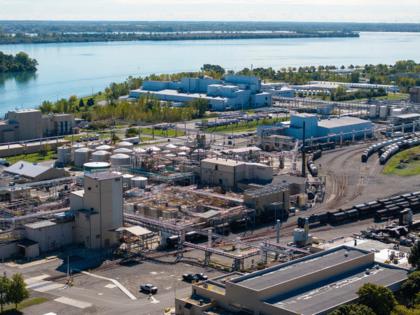What state and fed officials plan with BASF to stop pollution flowing into Detroit River
Published in News & Features
State and federal officials said they are working with a chemical manufacturing plant in Wyandotte on a "two-pronged approach" to limit the flow of contaminated groundwater into the Detroit River.
The meeting came after the Michigan Department of Environment, Great Lakes, and Energy (EGLE) wrote a letter to BASF in March, telling the company to take “all necessary and appropriate actions to … halt the flow of contaminated groundwater to the Detroit River.”
Officials with EGLE and the U.S. Environmental Protection Agency, which is the lead agency overseeing cleanup of BASF's North Works site, said they remain in conversation with company officials as they move forward on two remedial efforts: a long-term comprehensive plan and interim plan developed in 2023 after high contamination levels were reported.
"We're working on maintaining the interim while we're working on the final cleanup, so we're doing both," said Scott Ireland.
The interim plan involves monitoring contamination levels via extraction wells constructed around the site. EGLE regulators had found the wells, created by BASF to pump contaminated groundwater away from the river, generated fewer than 2 gallons per minute in mid-2024, while up to 60 gallons per minute flow to the river is required to meet the terms of a consent agreement BASF entered with the state in 1986.
EGLE officials requested follow-up readings and other data to determine the next steps.
"After a review of that, as well as site visits where we went out and observed the system ourselves … we did confirm that the system was flowing at a much lower rate than the design specification," said Elizabeth Garver from EGLE's Material Management Division.
The company now has until May 10 to respond to EGLE's finding that BASF is violating its agreement with the state. EGLE has declined to comment on what kind of enforcement actions the state may seek if the company fails to rectify the issue.
Soil at the BASF site on Biddle Avenue has long been polluted with mercury, per- and polyfluoroalkyl substances, and other volatile compounds considered harmful to consume.
A map displayed at Wednesday's meeting showed that the city of Wyandotte gets its municipal water supply from an intake site located just south of BASF's 230-acre campus. But Mayor Robert DeSana said his city's water is safe because the intake is situated "1,500 feet on shore (inland from the river), the length of more than four football fields, and positioned 30 feet below the surface. This distance and depth play a critical role in protecting our water supply from potential contamination and significantly reduce susceptibility compared to shoreline intakes."
The city's mayor told residents their drinking water is safe during an online public meeting Wednesday.
The mayor noted that the city's water management services team is considering adding granulated activated carbon to its water filtration system as a "proactive measure" that's also a requirement of a grant agreement through EGLE.
According to Wastewater Digest, an online publication dedicated to the municipal wastewater industry, granular activated carbon can help remove organic contaminants that produce unwanted smells or tastes from water.
For the long-term comprehensive plan, government officials said BASF's next deadline is Aug. 11, when a 95% basis of design is due. The plan will "consist of perimeter barriers, a groundwater collection and extraction system and an on-site water treatment facility," according to the EPA website. The EPA will review and potentially sign off on the design before mobilization and construction begin, sometime in 2027.
The plant manufactures products including polyurethanes used in carpet padding seat cushions and insulation; and specialty plastics and resins. The company is a major employer in Wyandotte, with more than 1,100 employees at the facility, according to a 2024 company fact sheet.
To comply with a 1986 consent agreement between BASF and the state, the flow rate into the extraction wells must reach between 10 and 90 gallons per minute, according to EGLE's letter.
EGLE's letter came after a longtime EGLE employee filed a complaint with the Michigan Attorney General's Office in October 2024, alleging his agency had known about the violations and yet allowed BASF to release hazardous waste into the Great Lakes and a "critical assessment zone" close to Wyandotte's drinking water intake system. A critical assessment zone is an area around a surface water intake deemed susceptible to contamination.
The employee, Art Ostaszewski, who now works as EGLE's drone pilot coordinator, said water sampling from 2021 showed pollution high enough to kill aquatic life.
The Attorney General's Office declined to pursue criminal charges against BASF in a March letter responding to Ostaszewski's complaint, saying "no recent testing has shown any danger to the water intake for the city of Wyandotte."
________
©2025 www.detroitnews.com. Visit at detroitnews.com. Distributed by Tribune Content Agency, LLC.







Comments